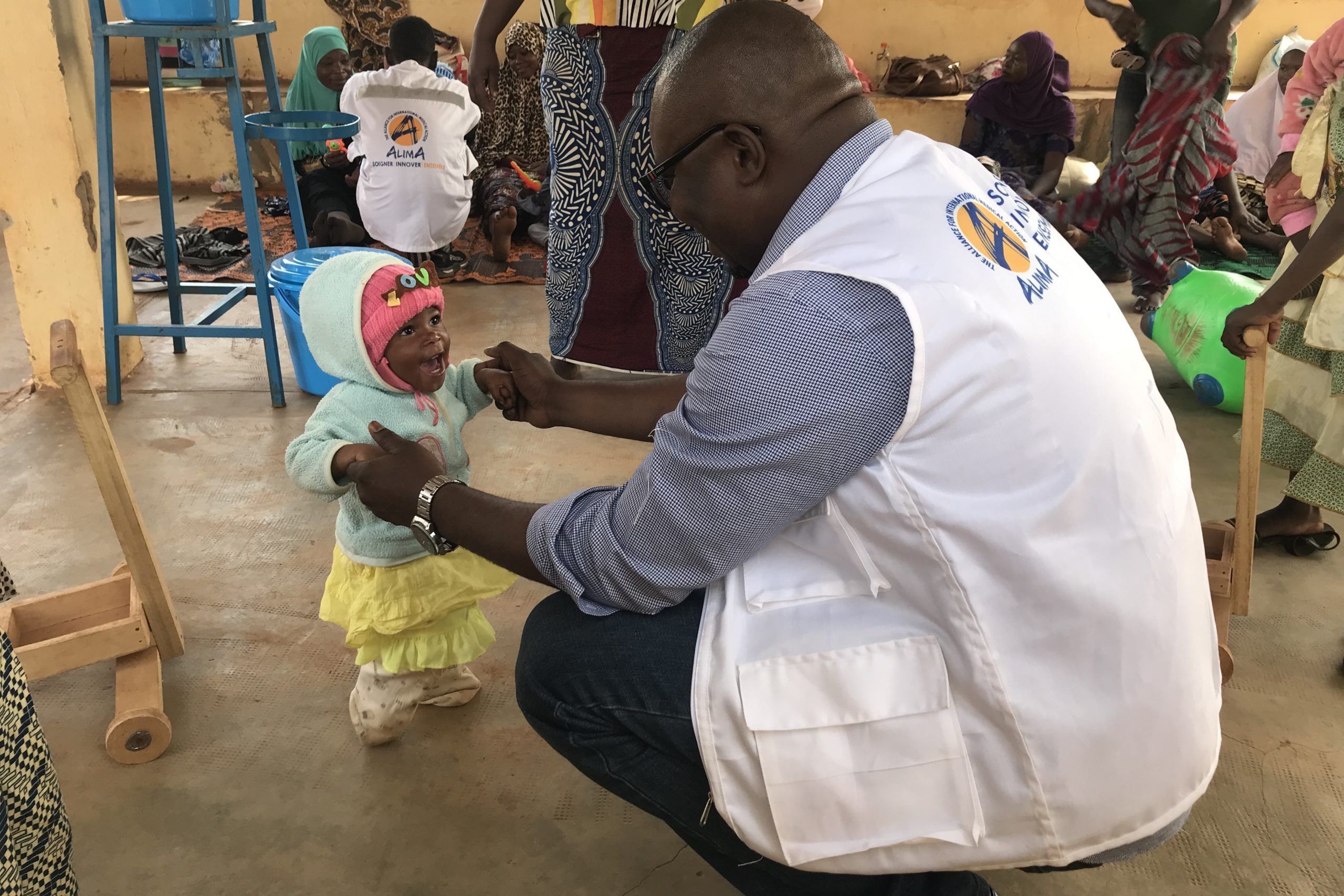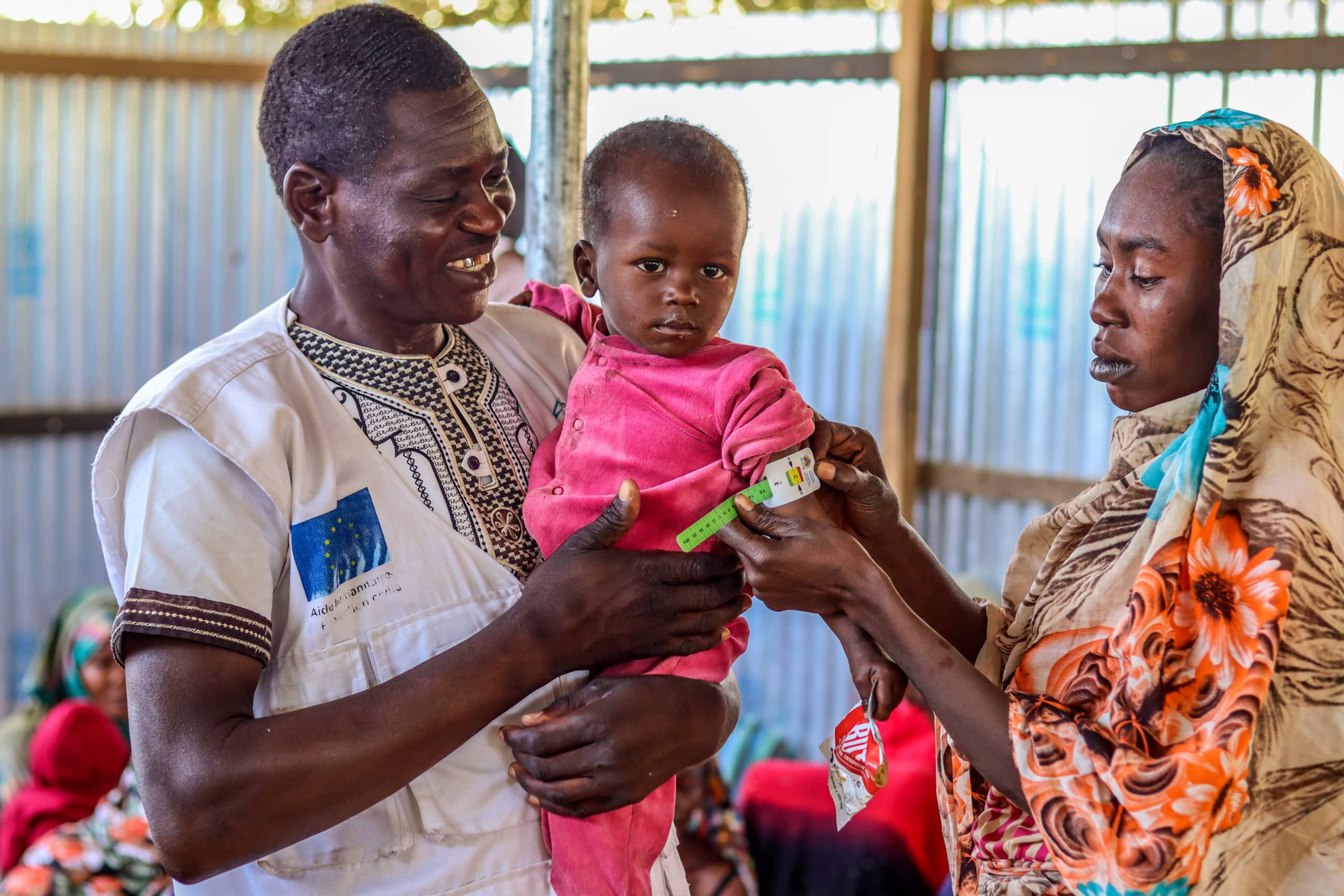During this cool, windy and dusty season, cases of respiratory illness are common. The children most-severely affected are admitted into intensive care, where they will be placed on an oxygen concentrator. In this ward, Marie, a nurse working for ALIMA (The Alliance for International Medical Action), checks on the children’s vital signs each hour.
“One morning, my daughter Fatimatou was having trouble breathing and had diarrhea,” said Habiba, as she sat on a hospital bed, watching her daughter’s stomach rise and fall with the rhythm of her breathing. “I immediately brought her the Mogodé hospital. We stayed three days and then we were transferred to the Mokolo District Hospital. When we arrived, they placed Fatimatou on an oxygen concentrator.”
Not far away, in the therapeutic feeding center, an assistant nurse was conducting an appetite test: he distributed therapeutic food to three children to see if they were able to eat without a nasogastric tube. The mothers, three Nigerian refugees from the Minawao camp, watched, speaking to each other in Kanuri, one of the local languages.
“When the camp ambulance brought us to the hospital, my daughter Hadidja was refusing to eat,” said her mother, Aïcha. “For the first two days she was fed with the help of a gastric tube. Today they removed the tube. She has gained weight and she is accepting food,” recounted Aïcha, visibly reassured.
The Mokolo District Hospital is a referral center for sick children from the Minawao refugee camp. If a child cannot be treated in the camp and needs to be hospitalized, he or she is transferred by ambulance to Mokolo.
Since 2009, the Far North Region of Cameroon has been weakened by the conflict between the military and the armed group Boko Haram in the Lake Chad area. Nearly 240,000 residents of Cameroonian villages on the Nigerian border have been forced to flee towards safer areas, and the region now hosts nearly 90,000 Nigerian refugees, the majority of whom are staying in the Minawao camp, located 15 kilometers from Mokolo.
“The displaced populations and refugees are living in very difficult conditions,” explained Dr. Abdou Souley, ALIMA’s medical team leader. “In the Minawao camp, for example, there are sometimes shortages of potable water, which leads to diarrheal illnesses.”
In order to instill proper health practices on the populations, and prevent malnutrition and illnesses related to poor hygiene and poor health practices, ALIMA works with local health promoters. Their role is to organize individual or group information sessions at the hospital with mothers of hospitalized patients. Themes include signs of malnutrition, children’s diet, breastfeeding and even basic hygiene practices.
“Health promotion is essential in this program, because teaching good practices allows for prevention,” said Dr. Souley, “and changing people’s behaviors to improve children’s health and nutritional state.”
The Alliance for International Medical Action (ALIMA) is a medical humanitarian organization that works hand-in-hand with local organizations to provide quality medical care to the most vulnerable populations in emergency situations or recurring crises. Headquartered in Dakar, Senegal, ALIMA has treated nearly 3 million patients since it was founded in 2009, and has launched more than a dozen research projects on malnutrition, malaria and Ebola.
ALIMA has been working in the Far North Region of Cameroon since May 2016. In the Mokolo health district, ALIMA has supported the pediatric and nutritional services of the district hospital since March 2016, as well as 11 peripheral health centers. ALIMA also supports outpatient sexual and reproductive health care. In addition to Mokolo, ALIMA operates in the Makary health district in Logone-et-Chari, by supporting the district hospital and 9 integrated health centers.
In 2017 in Cameroon, our teams performed more than 28,300 pediatric consultations, treated nearly 8,000 children suffering from severe acute malnutrition and trained more than 73,800 mothers to screen their children for malnutrition.
Photo: Alexis Huguet/ALIMA



